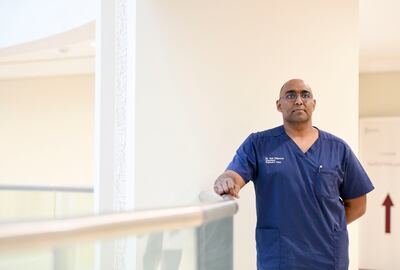Dementia and mental health services need urgent investment across the Middle East as the region faces a surge in elderly people requiring specialised social care.
A global report released during the World Health Assembly in Geneva by Alzheimer’s Disease International (ADI) has revealed that a 2017 international commitment to boost services for dementia patients has fallen well short of expectations.
The report, released on Wednesday, said 80 per cent of World Health Organisation member states failed to develop adequate services in line with the goals of the Global Action Plan on the Public Health Response to Dementia.
consultant in palliative medicine, Burjeel Medical City
With the deadline of the 2017-2025 plan approaching, the ADI called for a 10-year extension, to allow more time for governments to comply with international guidelines.
In the Middle East, dementia rates are expected to increase by 367 per cent, affecting 13.8 million people, by 2050.
National Dementia Plans are viewed as vital to ensuring health systems can provide diagnostics, treatments and critical care for the degenerative brain disorder.
“The global population is ageing, and dementia is reaching crisis levels across the globe,” said Paola Barbarino, chief executive of ADI.
“Dementia is the seventh leading cause of death globally, and increasingly the leading cause in many countries. The tally of national dementia plans is incredibly disappointing.
“There are only 38 WHO member state governments that currently have plans in place globally, a few have also expired, and many still do not have a budget attached to them.”
Action plan
The WHO Global Action Plan on dementia sets out ambitious goals, including a 50 per cent world diagnosis rate and the establishment of 146 National Dementia Plans across the 194 WHO member states by 2025.
Research by ADI showed 75 per cent of people living with dementia remain undiagnosed, while 85 per cent were not accessing support.
“Even with a low target of diagnosing half of people currently living with dementia, member states are not on track to reach this target,” said Ms Barbarino.
“Practically, this means more than half of people living with dementia won’t have access to new treatments when they become available and won’t be accessing vital care and support.”
Several initiatives launched by the Ministry of Health and Prevention in the UAE aim to address the growing need for elderly social support and mental health care.
Emirates Health Services has expanded its reach with more mobile clinical services into remote areas of Fujairah and Ras Al Khaimah.
Home care
The Ministry of Community Development provides primary healthcare and social, psychological and physical therapy to UAE citizens over the age of 60.
Home care services are offered to all Emiratis in Abu Dhabi, with specialist care offered by the Abu Dhabi Rehabilitation Centre.
Dr Neil Nijhawan, a consultant in hospice and palliative medicine in Abu Dhabi at Burjeel Medical City, said an older population also meant greater need for long-term care for comorbidities such as cancer.
“We are seeing an increasingly ageing population; with that we are seeing more older patients getting treatment for cancer,” he said.
“Incidence increases as you get older, and older patients have cancer treatment for longer. What it also means is that we're seeing a larger population of older people with dementia as well.
“Our proportion of older patients with dementia is increasing and I have noticed that in just the last four years since I've been here.”
Ageing communities
As we live longer, we accumulate associated medical problems that become more complex as we age, including cognitive impairments such as dementia.
Dr Nijhawan said careful planning is required to ensure all the needs of an ageing population are met.

“There needs to be a cultural shift towards acceptance of geriatric medicine as a speciality,” he said. “We definitely don't have enough geriatricians [in the UAE], but there are plans afoot to increase both the capacity of geriatric services and dementia.
“Generally, I don't think there is very good societal awareness of what geriatric doctors generally provide, so we have a shortfall there.”
Dementia is currently classified as a mental or behavioural disorder, but the WHO has proposed to reclassify diagnoses as a nervous system disease, to differentiate between mental health services.
As well as dementia care, the Middle East must also invest in wider mental health services, a new healthcare report has found.
Knight Frank MEA’s Healthcare mental health report showed a $4.3 billion investment was required to fulfil the demand for specialist care across the region.
The report found the UAE required 3,381 additional beds, while Saudi Arabia needs another 12,920 beds to meet the requirements of an expanding population with a developed mental health infrastructure.
“Incidence rates of conditions such as anxiety and depression are higher in [Saudi Arabia] and on par in the UAE when compared to the UK,” said Dr Gireesh Kumar, associate partner, strategy and consultancy at Healthcare, MEA.
“However, in terms of infrastructure, [Saudi Arabia] and UAE have a psychiatry bed density of 14.0 and 18.4 beds per 100,000 population, respectively, compared to 36.9 beds per 100,000 population in the UK.
“This highlights the disparity in the availability of mental health services and facilities in the region.”
The UAE’s 2030 Government Health Strategy identifies mental health care as less developed in comparison to other health areas.
The Dubai Health Authority and Department of Health, Abu Dhabi estimate 177 acute inpatient beds and 639 acute overnight beds are required for mental health services.
“To address the rising burden of mental health conditions, additional investment is required in the sector for both preventive and curative care,” Dr Kumar said.


